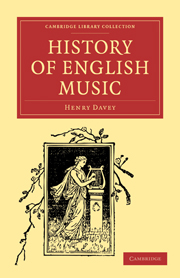Book contents
- Frontmatter
- PREFACE
- Contents
- CHAPTER I BEFORE THE INVENTION OF COMPOSITION
- CHAPTER II THE INVENTION OF POLYPHONY (1400–53)
- CHAPTER III THE PERIOD OF THE INVENTION OF INSTRUMENTAL COMPOSITION (1453–1536)
- CHAPTER IV THE REFORMATION: FROM THE DISSOLUTION OF THE MONASTERIES TO THE DEFEAT OF THE ARMADA (1536–88)
- CHAPTER V THE MADRIGALIAN PERIOD (1588–1630)
- CHAPTER VI THE AGE OF THE DECLAMATORY SONGS, OF THE FANCIES FOR VIOLS, AND OF THE SUPPRESSION OF ECCLESIASTICAL MUSIC (1630–1660)
- CHAPTER VII THE PERIOD OF FOREIGN INFLUENCE, AND OF DRAMATIC MUSIC (1660–1700)
- CHAPTER VIII THE PERIOD OF PATRIOTIC SONGS (1701–1800)
- CHAPTER IX THE NINETEENTH CENTURY
- APPENDIX
- INDEX
CHAPTER IX - THE NINETEENTH CENTURY
Published online by Cambridge University Press: 29 August 2010
- Frontmatter
- PREFACE
- Contents
- CHAPTER I BEFORE THE INVENTION OF COMPOSITION
- CHAPTER II THE INVENTION OF POLYPHONY (1400–53)
- CHAPTER III THE PERIOD OF THE INVENTION OF INSTRUMENTAL COMPOSITION (1453–1536)
- CHAPTER IV THE REFORMATION: FROM THE DISSOLUTION OF THE MONASTERIES TO THE DEFEAT OF THE ARMADA (1536–88)
- CHAPTER V THE MADRIGALIAN PERIOD (1588–1630)
- CHAPTER VI THE AGE OF THE DECLAMATORY SONGS, OF THE FANCIES FOR VIOLS, AND OF THE SUPPRESSION OF ECCLESIASTICAL MUSIC (1630–1660)
- CHAPTER VII THE PERIOD OF FOREIGN INFLUENCE, AND OF DRAMATIC MUSIC (1660–1700)
- CHAPTER VIII THE PERIOD OF PATRIOTIC SONGS (1701–1800)
- CHAPTER IX THE NINETEENTH CENTURY
- APPENDIX
- INDEX
Summary
THE story of our 19th century music is not very different from that of the 18th century, and largely consists of biographical details. In both periods there have been occasional intervals of self-satisfaction, which soon afterwards appears singularly unjustifiable; in both periods there have been very remarkable performances; in both periods there have been composers with admirable faculty in producing tunes that have become part of the national life, who yet could produce nothing larger than tunes. I desire, as far as possible, to exclude mention of living composers, as we cannot see them in their true perspective; they have indeed not finished their work, and all our leading composers at present are in middle age, and may yet do still better than they have done.
As the 19th century opened, there were several young men who had already attained considerable reputation as composers, and three had evinced such singular precocity that expectations were formed of them such as Mozart had aroused and had so gloriously fulfilled. None of these three, however, produced very special results, in one case certainly owing to misfortune.
The oldest and perhaps the most gifted was CHARLES WESLEY, son of the younger of those wonderful brothers whose purifying enthusiasm and energy revolutionised English religious life during the 18th century. When the father was engaged on his mission in Bristol, his eldest son was born there, Dec. 11th, 1757. At two years and three-quarters the child could play “a tune on the harpsichord readily and in just time,” and put a correct bass.
- Type
- Chapter
- Information
- History of English Music , pp. 432 - 500Publisher: Cambridge University PressPrint publication year: 2009First published in: 1895



